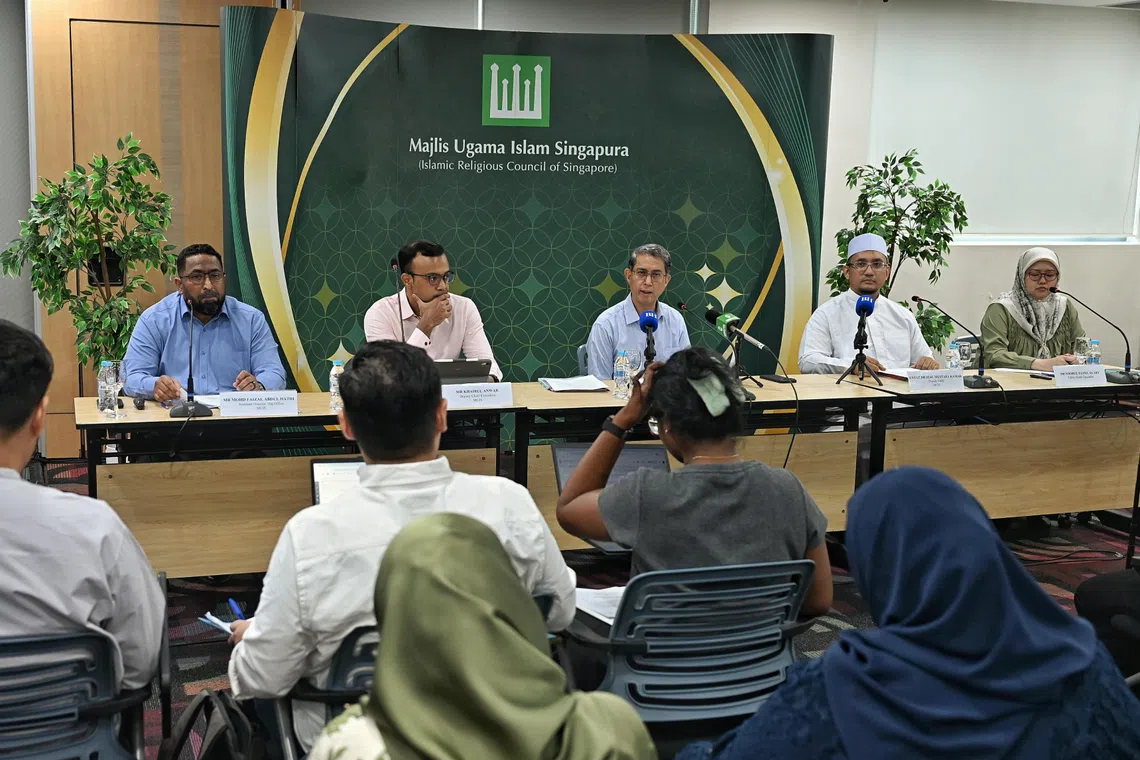Health certificate required for haj pilgrims from 2026, seniors above 70 to get selection priority
Sign up now: Get ST's newsletters delivered to your inbox

Acting Minister-in-charge of Muslim Affairs Faishal Ibrahim (centre) and Muis leaders at a media briefing on Oct 24.
PHOTO: BERITA HARIAN
SINGAPORE – From 2026, Muslims wishing to go on the annual haj pilgrimage will have to obtain a health certificate confirming they are medically fit.
They must also be physically capable of safely performing the haj rituals, under new requirements set out by Saudi Arabia’s Ministry of Hajj and Umrah.
The haj involves long walks, high temperatures and large crowds.
These are new prerequisites to qualify for the haj visa issued by Saudi Arabia, the Islamic Religious Council of Singapore (Muis) announced on Oct 24.
Given the stringent health requirements, Muis said it will prioritise applicants aged 70 and above who have received a letter of intent from Muis and are certified medically fit during the final stage of the selection process for the 2026 haj.
This is also to better support seniors still waiting for their pilgrimage, it said. Muis will review and adjust this approach for future selection.
Individuals who registered successfully before March 7, 2014, will begin receiving their letters for the 2026 haj from Oct 31, Muis noted.
They will have to get their medical certificates by Nov 21 from registered medical practitioners here.
The letter of intent is issued to those in the registration queue for the haj, with more than 50,000 people waiting for their turn for the annual pilgrimage as at 2024.
There are 900 slots allocated to Singapore
The haj is one of the five pillars of Islam, with Muslims who are physically and financially able to do so expected to perform the pilgrimage to Mecca at least once in their lifetime.
Muis listed several health conditions that would disqualify applicants, including major organ failure such as renal failure requiring dialysis, severe neurological or psychiatric disorders that impair cognition or cause significant motor disabilities, as well as seniors with dementia.
Those with communicable diseases such as tuberculosis or viral haemorrhagic fever, as well as cancer patients undergoing chemotherapy or other intensive treatments, will also not be permitted to perform the pilgrimage.
Those who are fully dependent on a wheelchair or other mobility devices, or require constant assistance in moving, will also not meet the Saudi authorities’ health requirements.
These requirements do not apply to the umrah, or minor pilgrimage, which can be performed at any time of the year.
However, those with conditions such as diabetes, hypertension or high cholesterol may still qualify, should they be able to manage their conditions and obtain the certificate.
Muis noted that together with Singapore’s Ministry of Health, it had issued guidance to registered medical practitioners regarding these requirements, as well as the processes needed before issuing the medical health certificate.
Individuals who accept their letter of intent and obtain their medical health certificate will then have to wait for the letter of offer, which will be issued from Dec 1.
Those who receive this formal invitation to perform the haj will then have to purchase their packages from Muis-appointed travel agents by Dec 15.
The new certification requirements apply to all prospective pilgrims globally, and are aimed at protecting the safety and well-being of all those on the haj, Acting Minister-in-charge of Muslim Affairs Associate Professor Faishal Ibrahim told reporters on Oct 24.
“We understand that this may affect some prospective pilgrims, especially our seniors and those with medical conditions,” said Prof Faishal during a media briefing.
He noted that under a fatwa, or religious ruling, issued by the Fatwa Committee – a panel of top Islamic scholars here that issues such rulings – those with medical reasons will be able to defer their pilgrimage until after they have recovered.
The fatwa, issued on Oct 24, also states that those with conditions they are unlikely to recover from can appoint a proxy.
If a Muslim is also unable to fulfil the haj by proxy despite his or her best efforts, the fatwa notes the obligation to perform the haj is lifted, in line with the Islamic principles of avoiding harm and difficulty.
Association of Muslim Travel Agents Singapore honorary secretary Ustazah Juyda Noor Mohamad said that, while there would be challenges adapting to the requirements, the association supported the move and would work with Muis, as well as its member agencies, to ensure pilgrims adhered to them.
Mr Haffidz Abdul Hamid, general manager of haj travel agency Halijah Travels, said his company had previously handled pilgrims who required dialysis, as well as those in wheelchairs, but noted that these cases had posed logistical issues.
“We sympathise with those who require these additional services (for the haj), but they may no longer be available under current conditions,” he said.
Singapore is actively engaging the Saudi government to request more places to be allocated, Prof Faishal added, noting that he would be travelling to Saudi Arabia in November to continue such engagements.



